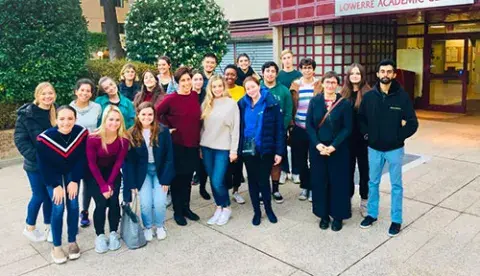
Whether it was South Africa, Switzerland or Europe, this semester our students had a chance to experience Academic Travel in numerous ways. The course “European Food Systems: You Are Where You Eat” taught by Vice President and Dean of Academic Affairs, Sara Steinert Borella, had the unique opportunity to participate in the trans-European #AlpFoodway project.
When this group of students ventured to the Poschiavo Region in Switzerland and the Val Camonica in northern Italy, they learned not only what it takes to become an active food citizen, but also how to work with practitioners engaged in safeguarding Alpine Food Heritage.
While on travel, the students saw firsthand how food heritage is strongly linked to identity for people living in these regions. They also learned how the AlpFoodway’s latest initiative, the #AlpFoodway Project, works to counter the factors that put traditional Alpine food heritage at risk, including depopulation, aging population and globalization, by contributing to the safeguarding of Alpine Food Heritage through its efforts to join the Representative List of Intangible Cultural Heritage.
According to Vice President Steinert Borella, “Working with partners in Poschiavo in Switzerland and the Val Camonica in Italy provided students a hands-on experience with local farmers, cheese makers and restaurant owners, working together to learn more about traditional methods and to get the word out about the traditional foodways.”
If for Jonathan Bystrowski ‘22, going on travel showed him “real life examples of tangible and intangible cultural heritage that embodies the people we met and their respective lifestyles,” his study abroad classmate Selin Oney noted, “The dynamic nature of this course has taught me how to be a more conscious consumer in today’s highly globalized world. Visiting various locations with rich cultural heritage allowed me to understand the true goal behind the AlpFoodway project.”
Indeed, conveying the message to a larger group of people, both globally and locally, proved to be key in the success and preservation of local traditions in Poschiavo. According to Tanya O’Malley ’22, “Before this experience, the terms ‘biological’ and ‘organic’ had little meaning to me and had little impact on what I chose to eat, simply because I had so little knowledge on what they actually mean. Now I am able to understand how growing a product in a certain region under particular weather and soil conditions, and using unique processing methods, can greatly change the flavor and quality of a product.”
Now that this Academic Travel course proved to help these students understand something that they would not learn just in a classroom, Senior Giovanna Centeno Barbalho ’19, and coordinator of the AlpFoodWay project for her Academic Travel course, is looking forward to collecting photos, audio material and pamphlets to populate a database which will then be shared with AlpFoodWay representatives for a final release of the results in October 2019.
To be continued ;)

